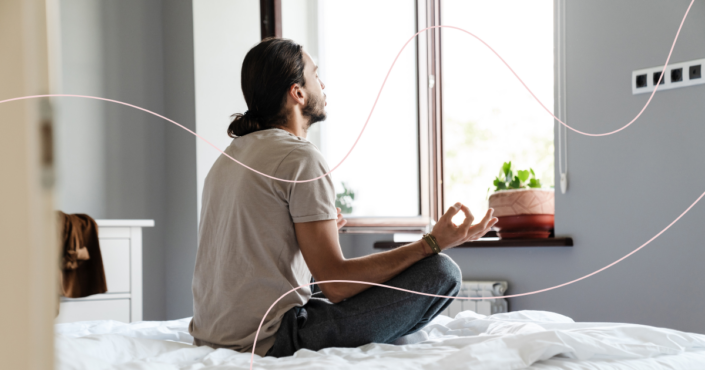Nurses, are you struggling to stay focused and calm? If yes, then you can reap huge benefits from meditation — to both work life and personal life.
Meditation can feel like a daunting task for many people. Others love it and swear by it. As a person who is certified to teach meditation, I will say that even I don’t dedicate enough time to my meditation practice, so don’t be too hard on yourself!
Ten minutes a day is enough to reap huge benefits! Making it a habit is your best bet to sticking with your practice. Some days will get away from you, and that’s okay. Remember that no matter how little or how much you do sit to meditate, it’s extremely beneficial.
There are so many benefits to practicing self-care, including meditation. Meditation boosts our internal sense of calm, increases productivity, clears the mind, improves focus, reduces stress and anxiety, and regulates mood. Aside from the daily benefits, meditation also allows us to tap into our internal strength and the divine within us.
In a study from Yale, research shows meditation slows aging of the brain and helps preserve grey matter in the brain. It’s literally anti-aging for the brain! In another study conducted by Harvard, researchers found after 8 weeks of meditation, people had a decrease in their brain cell volume in the amygdala. The amygdala is the area of the brain that sends signals of anxiety, fear, and stress. This meant the study participants felt less anxiety, fear, and stress in their daily lives.
Many people know why they should meditate, but they don’t know how or where to start. Below are a couple tips and online apps you can use to build on your practice.
Tips for Sticking with Meditation
- Anyone can meditate! I always like to share this with people. I often hear comments like, “I can’t meditate, because my brain doesn’t turn off”. The key here is that meditation is not meant to turn off your brain. Meditation teaches us to allow the thoughts we have to pass while not taking over our mind. It’s about learning how to stop our thoughts from controlling us.
- Start small. Five to ten minutes of meditation each day is amazing! Consistency is key. Once you build the habit of meditating, it’s easier to then add time to each meditation if that’s your goal.
- When your mind wanders, bring it back to the breath. Having a mantra like “ohm” or counting the inhale and exhale can help bring your awareness back to the present. Imagine a river with leaves floating down it, and that each of those leaves are thoughts. The purpose of meditation is to allow the river of thoughts to continue to flow while not picking up each leaf for examination or to hold onto.
- There are multiple types of meditation, so find one that works for you. Some people prefer to sit in a silent room, others lean towards guided meditations, and some find moving meditations work best for them. Try different types until you find something that resonates with you.
- There’s no right time to meditate, but give mornings a try. Many teachers recommend meditating when you first wake up. It’s a nice way to wake up slowly and meditate before all the normal interactions start in your day. You might find it’s easier to focus on the breath and soothe a wandering mind.
- Give yourself grace and show yourself kindness. Don’t be hard on yourself if your mind is extra active somedays. It’s completely normal. Sometimes you’ll find it easy to meditate for an extended period, while other days it feels like you’ve been meditating forever. It’s our mind’s job to think and create, so naturally, some days it’s harder to get away from your thoughts. That’s why it’s called a meditation practice. Keep showing up and the benefits will follow.
Meditation Apps and Podcasts
- “Ten Percent Happier” is a podcast by Dan Harris that is really informative and educational. He discusses with guests on the show different types of meditation, benefits to meditating, and how meditation has changed their perspective. The podcast is free to listen to and a great place to start if you’re interested in learning about different types.
- There is also an app called “Ten Percent Happier”. The app walks you through some questions about your daily life, stress levels, prior meditation practice, etc. to come up with a meditation plan for you. It’s $100/year for the subscription. The app includes meditation courses, sleep meditations, and hundreds of others with features like concentration, deep relaxation, self-compassion, etc.
- Alo Moves is an app that has a lot of great meditation options with multiple different teachers, so you can find one that resonates with what you’re looking for. Some personal favorites are the sound bath meditations on the app. Alo moves also has yoga classes, HIIT, Pilates, and tons of other classes along with the guided meditations. The Alo app is free to try for 14 days, then $20/month, or they offer annual memberships at $139/year.
- Calm is another useful app for meditating. They offer multiple sleep stories for those who have a hard time falling asleep, and the “Daily Calm” which is a 10-minute daily meditation. The app also includes a 30-day program on how to meditate for beginners. There are tons of guided meditations ranging from beginner to expert so everyone can find something. There’s a free 7-day trial, then it’s $15/month or $70/year.
- Headspace is another app that is more geared towards those who are beginning their meditation journey. There are themed meditations and other’s that are broken down into length which is helpful when you don’t have a ton of time! The Headspace app offers a 7-day trial, followed by $13/month or $70/year.
- Last but not least, Operation Happy Nurse. OHN is a nonprofit started by a fellow nurse named Shannon McPeek. It’s a free platform that offers resources to aid in nurses’ mental health and well-being. On the website you’ll find guided meditations along with yoga and other fitness classes. It’s easy to sign up with your RN information and free to be a part of the online community.









